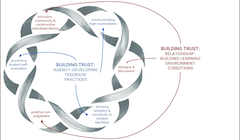Building Trust Through Feedback: A Conceptual Framework for Educators
DOI:
https://doi.org/10.20343/teachlearninqu.13.7Keywords:
trust, instructor feedback, relationship-building, agency-developingAbstract
Trust is fundamental for effective student engagement with feedback in higher education. This study aimed to develop a conceptual framework delineating the specific instructor practices and learning environment conditions that facilitate trustful feedback processes. Open-ended survey responses from higher education instructors (n=147) were analysed using a qualitative methodology. Analysis revealed three key environmental conditions for building trust-based relationships: positive non-judgment; inclusion, community, and constructive interdependence; and dialogue and discussion. Three instructor feedback practices were found to promote student agency: showing empathy and sensitivity to student identities, communicating high expectations, and promoting student self-evaluation. These relationship- building conditions and agency-promoting practices operate synergistically, as represented by our framework of Building Trust Through Feedback. By continuously cultivating this interplay of environmental and relational factors, instructors can engender greater reciprocity, vulnerability, and growth during the feedback process. The proposed framework provides guidance on trust-building pedagogies that enhance student engagement and learning. Further research should explore student perspectives on practices that build trusting instructor-student relationships.
References
Boud, David, and Phillip Dawson. 2023. “What Feedback Literate Teachers Do: An Empirically-Derived Competency Framework.” Assessment & Evaluation in Higher Education 48 (2): 158–71. https://doi.org/10.1080/02602938.2021.1910928. DOI: https://doi.org/10.1080/02602938.2021.1910928
Carless, David. 2013. “Trust and Its Role in Facilitating Dialogic Feedback.” In Feedback in Higher and Professional Education: Understanding It and Doing It Well, edited by David Boud and Elizabeth Molloy, 90–103. New York: Routledge.
Carless, David, and Naomi Winstone. 2023. “Teacher Feedback Literacy and Its Interplay with Student Feedback Literacy.” Teaching in Higher Education 28 (1): 150–63. https://doi.org/10.1080/13562517.2020.1782372. DOI: https://doi.org/10.1080/13562517.2020.1782372
Costa, Arthur, and Bena Kallick. 1993. “Through the Lens of a Critical Friend.” Educational Leadership 51 (January).
Curzon-Hobson, Aidan. 2002. “A Pedagogy of Trust in Higher Learning.” Teaching in Higher Education 7 (3): 265–76. https://doi.org/10.1080/13562510220144770. DOI: https://doi.org/10.1080/13562510220144770
Felten, Peter, Rachel Forsyth, and Kathryn A. Sutherland. 2023. “Building Trust in the Classroom: A Conceptual Model for Teachers, Scholars, and Academic Developers in Higher Education.” Teaching & Learning Inquiry 11 (July). https://doi.org/10.20343/teachlearninqu.11.20. DOI: https://doi.org/10.20343/teachlearninqu.11.20
Felten, Peter, and Leo M. Lambert. 2020. Relationship-Rich Education: How Human Connections Drive Success in College. Baltimore, MD: Johns Hopkins University Press.
Hattingh, Teresa. 2023. “Exploring the Social Aspects of Assessment Practices in an Engineering Context.” Scholarship of Teaching and Learning in the South 7 (3): 5–24. https://doi.org/10.36615/sotls.v7i3.349. DOI: https://doi.org/10.36615/sotls.v7i3.349
Jensen, Lasse X., Margaret Bearman, and David Boud. 2021. “Understanding Feedback in Online Learning – A Critical Review and Metaphor Analysis.” Computers & Education 173 (November): 104271. https://doi.org/10.1016/j.compedu.2021.104271. DOI: https://doi.org/10.1016/j.compedu.2021.104271
Jones, Gareth R., and Jennifer M. George. 1998. “The Experience and Evolution of Trust: Implications for Cooperation and Teamwork.” The Academy of Management Review 23 (3): 531. https://doi.org/10.2307/259293. DOI: https://doi.org/10.2307/259293
Li, Jinrui, and Rosemary De Luca. 2014. “Review of Assessment Feedback.” Studies in Higher Education 39 (2): 378–93. https://doi.org/10.1080/03075079.2012.709494. DOI: https://doi.org/10.1080/03075079.2012.709494
Mayer, Roger C., James H. Davis, and F. David Schoorman. 1995. “An Integrative Model of Organizational Trust.” The Academy of Management Review 20 (3): 709. https://doi.org/10.2307/258792. DOI: https://doi.org/10.2307/258792
McKnight, D. Harrison, and Norman L. Chervany. 2001. “What Trust Means in E-Commerce Customer Relationships: An Interdisciplinary Conceptual Typology.” International Journal of Electronic Commerce 6 (2): 35–59. https://doi.org/10.1080/10864415.2001.11044235. DOI: https://doi.org/10.1080/10864415.2001.11044235
Mutoni Griffiths, Camilla, Lisel Murdock-Perriera, and Jennifer L Eberhardt. 2023. “‘Can You Tell Me More about This?’: Agentic Written Feedback, Teacher Expectations, and Student Learning.” Contemporary Educational Psychology 73 (April): 102145. https://doi.org/10.1016/j.cedpsych.2022.102145. DOI: https://doi.org/10.1016/j.cedpsych.2022.102145
Nicol, David J. 2010. “From Monologue to Dialogue: Improving Written Feedback Processes in Mass Higher Education.” Assessment & Evaluation in Higher Education 35 (5): 501–17. https://doi.org/10.1080/02602931003786559. DOI: https://doi.org/10.1080/02602931003786559
Nicol, David, and Lovleen Kushwah. 2024. “Shifting Feedback Agency to Students by Having Them Write Their Own Feedback Comments.” Assessment & Evaluation in Higher Education 49 (3): 419–39. https://doi.org/10.1080/02602938.2023.2265080. DOI: https://doi.org/10.1080/02602938.2023.2265080
Nieminen, Juuso Henrik, and David Carless. 2023. “Feedback Literacy: A Critical Review of an Emerging Concept.” Higher Education 85 (6): 1381–1400. https://doi.org/10.1007/s10734-022-00895-9. DOI: https://doi.org/10.1007/s10734-022-00895-9
O’Donovan, Berry M., Birgit den Outer, Margaret Price, and Andy Lloyd. 2021. “What Makes Good Feedback Good?” Studies in Higher Education 46 (2): 318–29. https://doi.org/10.1080/03075079.2019.1630812. DOI: https://doi.org/10.1080/03075079.2019.1630812
Padayachee, Kershree, and Kibbie Naidoo. 2023. “Reframing and Re-Purposing Assessment in Higher Education in the Global South.” Scholarship of Teaching and Learning in the South 7 (3): 1–4. https://doi.org/10.36615/sotls.v7i3.381. DOI: https://doi.org/10.36615/sotls.v7i3.381
Payne, Ameena L., Cathy Stone, and Rebecca Bennett. 2022. “Conceptualising and Building Trust to Enhance the Engagement and Achievement of Under-Served Students.” The Journal of Continuing Higher Education 71 (2): 1–18. https://doi.org/10.1080/07377363.2021.2005759. DOI: https://doi.org/10.1080/07377363.2021.2005759
Pokorny, Helen, and Pamela Pickford. 2010. “Complexity, Cues and Relationships: Student Perceptions of Feedback.” Active Learning in Higher Education 11 (1): 21–30. https://doi.org/10.1177/1469787409355872. DOI: https://doi.org/10.1177/1469787409355872
Saldaña, Johnny. 2021. The Coding Manual for Qualitative Researchers. 4th ed. Thousand Oaks, CA: SAGE Publishing.
Steen-Utheim, Anna, and Anne Line Wittek. 2017. “Dialogic Feedback and Potentialities for Student Learning.” Learning, Culture and Social Interaction 15 (December):18–30. https://doi.org/10.1016/j.lcsi.2017.06.002. DOI: https://doi.org/10.1016/j.lcsi.2017.06.002
Winstone, Naomi E., and David Carless. 2019. Designing Effective Feedback Processes in Higher Education: A Learning-Focused Approach. 1st ed. London: Routledge. https://doi.org/10.4324/9781351115940. DOI: https://doi.org/10.4324/9781351115940-1
Xu, Yueting, and David Carless. 2017. “‘Only True Friends Could Be Cruelly Honest’: Cognitive Scaffolding and Social-Affective Support in Teacher Feedback Literacy.” Assessment & Evaluation in Higher Education 42 (7): 1082–94. https://doi.org/10.1080/02602938.2016.1226759. DOI: https://doi.org/10.1080/02602938.2016.1226759
Yan, Zi, and David Carless. 2022. “Self-Assessment is About More Than Self: The Enabling Role of Feedback Literacy.” Assessment & Evaluation in Higher Education 47 (7): 1116–28. https://doi.org/10.1080/02602938.2021.2001431. DOI: https://doi.org/10.1080/02602938.2021.2001431
Yang, Min, and David Carless. 2013. “The Feedback Triangle and the Enhancement of Dialogic Feedback Processes.” Teaching in Higher Education 18 (3): 285–97. https://doi.org/10.1080/13562517.2012.719154. DOI: https://doi.org/10.1080/13562517.2012.719154

Downloads
Published
Issue
Section
License
Copyright (c) 2025 Breana Bayraktar, Kiruthika Ragupathi, Katherine A. Troyer

This work is licensed under a Creative Commons Attribution-NonCommercial 4.0 International License.






